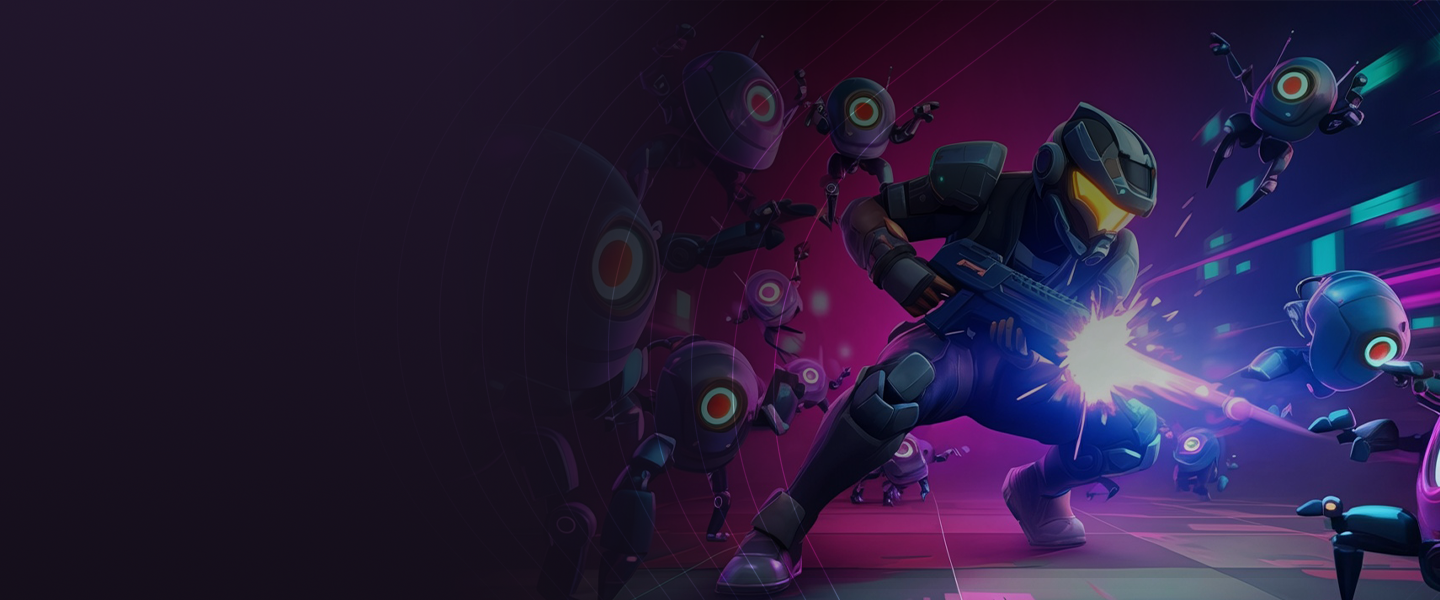Video gaming has been growing at an astonishing rate – especially in the last two years, during the COVID-19 pandemic. There are more than two billion gamers worldwide, playing a wide selection of games on their devices – and a huge proportion of them take part in competitive online multiplayer games. With this increase, we have also been observing a rise in cheating. The ways in which it happens are becoming more sophisticated, making cheat prevention more important than ever.
How does cheating affect honest players, game designers and developers, and the industry as a whole? And is there a solution to ensure game cyber security? In this article, we discuss it from A to Z. Happy reading!
Table of Contents
What is cheating in video games?
What tricks are commonly used to cheat in video games?
How is cheating in video games affecting honest gamers’ experience?
How is cheating affecting the gaming industry?
What is the financial impact of cheating in video games?
How can you protect your game from cheaters?
What are anti-cheat solutions?
How do anti-cheat solutions work?
Do anti-cheat solutions impact game performance and gaming experience?
Are kernel-mode anti-cheat solutions safe?
Are kernel-mode anti-cheat solutions compromising my privacy?
Can I uninstall anti-cheat?
How much does anti-cheat cost?
How do I get started protecting my video game with anti-cheat?
What is cheating in video games?
So, let’s start with a definition. Cheating in a video game means gaining an advantage beyond normal gameplay. In single-player games, this is often to make the game easier to play. Meanwhile, in multiplayer titles, it gives the cheater a competitive edge over other players. Cheaters either exploit an internal weakness found within a game (e.g., a bug) or use external tools devised especially for cheating. This is a significant challenge for game cyber security.
What tricks are commonly used to cheat in video games?
Video game cheaters use a wide range of tricks to gain an unfair advantage. Here are the most popular forms of cheating:
- Aim Bots ensure cheaters automatically have perfect aim at any opponent.
- Trigger Bots cause the cheater’s weapons to automatically fire when their target is in the crosshairs.
- Wall Hacks enable cheaters to see hidden threats or targets through walls
- Camera Hacks give cheaters a wider view of the game world than other players or the developer intended.
- Lag Switches delay an opponent’s action, so the cheater has an advantage.
- ESP on-screen visuals that reveal information to the cheater, such as the cooldown time of enemy abilities or the locations of spawned loot.
- Removal eliminates challenging elements of the game to make the cheater’s play easier.
- Radar gives cheaters a map showing the location of opponents, items, power-ups etc.
- Unlocking gives immediate access to characters, achievements or costumes that must usually be bought or earned.
- Drop Hacks and DDOS (distributed denial of service) disconnect the cheater just before they lose a game or disconnect opponents to make gameplay easier.
- Boosting/Farming/Stat-Padding artificially boosts win rates and rankings by using fake accounts or opponents who agree to lose.
- Currency Manipulation gives video game cheaters easy access to currency via coin farms while everyone else must earn or buy it.
- Scripting allows cheaters to automatically respond perfectly and instantly to opponent actions.
How is cheating in video games affecting honest gamers’ experience?
Irdeto’s Global Gaming Survey established that 33% of players admit that other players cheating negatively impacted their multiplayer gaming experience, 18% state that this happens often, and a further 8% – that it happens constantly. When you add up those numbers, cheating affects a significant 59% of players – almost 2 in 3!
And where’s the risk? Cheating causes a great imbalance in how other players experience the game. They become frustrated and can quickly give up the game, picking other titles – especially given the wealth of options available. This is particularly true in the case of games based around competitive elements or the use of leagues. So, if cheat prevention is not thoroughly implemented, the game loses engagement with its competition.
But there’s more.
Some frustrated players follow the logic that says if you can’t beat someone, you join them. So, when others around them aren’t playing by the rules, they start cheating to compensate for the unfair advantage other players have.
32% of the gamers surveyed admitted to cheating at least once, with 12% owning up to regular or constant use of cheats. That’s almost half of the players! The normalization of cheating inspires a downward spiral.
How is cheating affecting the gaming industry?
Cheaters not only ruin games for honest players, but they also pose challenges for game publishers. Why? It’s simple: if a game is seen as a cheater’s game, players are more likely to abandon it and move to games with better cheat prevention, ensuring a fairer gaming environment. They take not only their engagement but also their money with them.
It is essential to remember that the video game industry no longer makes most of its money by selling the actual games. Nowadays, a large percentage of the revenue is generated through in-game purchases. There’s no business with no players remaining, so loyalization is the key to financial success.
And to add insult to injury, there’s also the spread of reputational damage. A game that struggles with cheating and lacks effective anti-cheat solutions attracts fewer players. Honest players avoid games plagued by cheaters since it serves no purpose for them to devote their time and effort to a game with weak game cyber security.
Here are some numbers for you to think about: 76% of the gamers surveyed stated that it’s important to them that competitive online multiplayer games are secured against cheaters. And the brand and reputational damage caused by cheaters put 78% of consumers off a game. 46% of gamers are less likely to buy in-game content if they encounter cheating (Irdeto’s Global Gaming Survey).
Without new players, it’s impossible to build user loyalty.
So, as you can see if left unchallenged, game cheating can lead to shrinking revenue. And this can even put a game publisher out of business.
What is the financial impact of cheating in video games?
It is, of course, difficult to put a hard monetary figure on the cheating in video games problem. But considering the findings of our Irdeto’s Global Gaming Survey, we can give you an estimate. The annual global online gaming market is about US$37 billion. So, if 78% of gamers are put off a game because of cheating, as reported in the survey, nearly US$29 billion of revenue is at stake!
How can you protect your game from cheaters?
Many tools and processes are available for cheat prevention. Here are the most effective approaches to solving the problem:
- Smart design
Truly effective anti-cheat starts at the first line of the game code. Assume your clients cannot be trusted and design games with authoritative servers. Restrict clients to receiving only the data they absolutely need. This is the most effective first step to limit cheating.
- Patch prevention
Use tools that encrypt and secure critical variables to enable gameplay elements to resist in-memory attacks. Tools that perform integrity verification of game files can ensure cheat prevention from offline tampering with game logic, data, or assets.
- Communication protection
To prevent man-in-the-middle attacks and manipulation of player data, absolutely use data encryption. In this way, you protect client-server communication protocols.
- Process isolation
Use Anti-Hooking, Anti-Debug and process handle hiding techniques to make it harder for cheaters to access the running game process.
- Obfuscation and virtualization
If you obfuscate and virtualize code, you limit static analysis of critical game logic. This helps prevent data mining of preloaded content, special events or late-game secrets.
- Analyze behavior
Statistical analysis of player behavior can identify many cheat techniques such as scripts, aim bots and trigger bots.
- Monitor and enforce
Hire expert cyber intelligence and enforcement to rapidly identify and disrupt sites that promote cheating tools or techniques. On top of everything, they damage your game’s reputation. Never underestimate the importance of cheat prevention!
What are anti-cheat solutions?
Anti-cheat solutions prevent players of online games played in multi-gamer mode from gaining an unfair advantage through the use of third-party tools. You can think of them as your own game policing unit – it keeps an eye on gamers, identifies cheaters and – if necessary – sanctions players so that honest players can enjoy their game.
How do anti-cheat solutions work?
Typically, anti-cheat solutions monitor a player’s game and detect unauthorized use of third-party programs or modifications to the game. Depending on the solution, anti-cheat will first prevent the user from playing the game, then it will ban the user’s account for a certain period.
Do anti-cheat solutions impact game performance and gaming experience?
A good anti-cheat solution does not interfere with the regular operation of the operating system and does not cause errors or reduce stability to system performance. Of course, running any additional software, like an anti-cheat, requires system resources. Still, anti-cheat overhead is usually hundreds of times smaller than those needed for a blank tab open in your internet browser. So, a good anti-cheat system doesn’t impact game performance or gaming experience.
Are kernel-mode anti-cheat solutions safe?
A kernel-mode driver is a piece of code that runs at a high privilege level on your system and can access all resources on your computer without asking for permission. Running the driver component in kernel-mode can raise concerns, but kernel-level access is needed to detect cheaters effectively.
Since the cheaters are using it to access the game, so have anti-cheat software providers to be able to stop them. There are many risks associated with kernel-mode drivers, like blue screens. If running in the kernel could be avoided, providers would be happy to avoid the risk of kernel-mode drivers. However, delivering security in the kernel is recommended by Microsoft.
It’s worth mentioning that the most popular multiplayer games, with hundreds of millions of players, have adopted kernel-mode anti-cheat for effective protection, e.g., Fortnite, Fall Guys: Ultimate Knockout, Halo: The Master Chief Collection, Player Unknown’s Battlegrounds, Rainbow Six Siege, Apex Legends, VALORANT.
Are kernel-mode anti-cheat solutions compromising my privacy?
It depends on the provider. A responsible provider will not build its solution in a way that violates gamers’ privacy, so no personally identifiable information leaves your machine.
Can I uninstall anti-cheat?
Absolutely! A good anti-cheat solution will make no effort to hide itself, will always ask for your permission to be installed, and you will be able to uninstall it with one click.
Some services allow drivers to be installed on your computer without asking your permission, for convenience. A good provider will never do this silently and will always ask your permission first.
How much does anti-cheat cost?
It costs less than you think to protect a game from cheaters. If you compare the cost of such an investment with the cost of lost revenue due to players leaving your game (or not doing the in-game purchases), implementing an anti-cheat system into your game becomes a no-brainer.
How do I get started protecting my video game with anti-cheat?
It’s simple: reach out to us and start a conversation!













/Images/Module%20-%20footer/spiral.svg)
